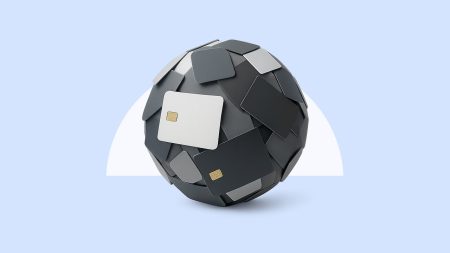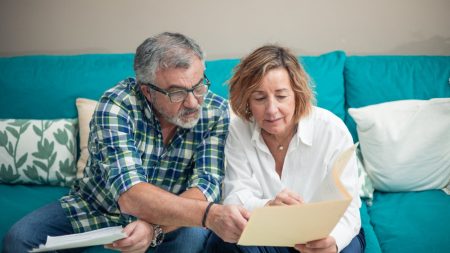Edwin Tan/ Getty Images; Illustration by Austin Courregé/Bankrate
Key takeaways
- A charge-off is when a lender writes off your account as a loss and closes the account for further use.
- You are still legally responsible for the balance that is charged off.
- The lender may transfer the debt to a collection agency to negotiate a settlement with you.
- A charge-off could result in two collections on your credit report — one from the collection agency and one from the original lender.
- Your credit score is negatively impacted by a charged-off credit account.
If your payments are delinquent for several months on a credit card or loan, you may get a charge-off notice from the creditor. Although the notice may indicate the lender is no longer expecting payments, it doesn’t mean you’re off the hook for the remaining balance.
Your credit score may take a hit, but there are things you can do to minimize the damage and settle the debt. Understanding how charge-offs work and what you can do about them may help you develop a plan to improve your creditworthiness in the future.
What does charge-off as a bad debt mean?
When a lender charges off an account as bad debt, it means it no longer intends to try to collect payment on it. This usually happens after the lender has tried to get a payment from a borrower via mail, phone or email for four to six months.
The lender may call this a profit-and-loss write-off, and report it to all three credit bureaus, where it typically stays on your credit report for at least seven years. The account is often sold to third-party collection agencies who begin contacting you regarding payment on behalf of the original creditor.
You may be able to negotiate with your creditor to have it removed once you agree to a settlement amount with the collection agency. A creditor’s ability to collect on your debt even after it’s charged off depends on the state you live in.
Keep in mind:
Charged-off debt is not the same as canceled debt. The lender still expects to get paid some or all of the amount owed. With canceled debt, the lender forgives some or all of the balance owed.
How charged-off debt affects your credit
A charge-off impacts the payment history portion of your credit score. Considering 35 percent of your FICO score is based on payment history, a charge-off can lower your score significantly.
A charge-off also tells future creditors that you weren’t able to pay off the balance. This could affect you if you want to rent an apartment, apply for a job or even get home or car insurance. Even if you agree to pay some or all of the balance off, it will still show up as negative on your credit report.
Negotiating charge-off debt
If you are in the financial position to repay some or all of the charge-off balance you owe, you can start the negotiation process. The Consumer Financial Protection Bureau (CFPB) suggests these steps:
- Confirm the debt is yours and what it’s for: You’ll most likely be contacted by a collection agency once the loan is charged off. The collection agency should be able to identify the original account and may have preplanned payment options for you.
- Decide what you can afford: Take an honest and detailed look at your budget to make sure you can afford whatever payment you propose. You may be surprised at how low the payment is, but lower payments usually mean you’ll be paying the debt off longer.
- Ask about a debt settlement amount: Collection agencies may be willing to give you a 50 percent or more reduction in the amount owed.
- Get it all in writing: Make sure you get written confirmation of the amount agreed to. You may need it as proof to remove the charge off your credit later, or to at least show it was paid rather than unpaid.
What to do if you have a charge off
By law, creditors and debt collectors should provide details about the charged-off debt. This written correspondence is called a validation notice or debt validation letter and is required within five days of contacting you. The letter or notice should include the amount you allegedly owe, the name of the original creditor and instructions on how to contest the debt if it’s not yours.
Once you receive the validation notice, ask yourself the following:
Is the account yours?
The account could be mixed up with a relative with a similar name or an error. If it is, send a letter to the reporting bureaus contesting the account. If you paid the account off, provide bank statements or other documents that prove that.
Once the credit reporting agency and the creditor receive the dispute, it has 30 days to prove or disprove it. If it was an error, the credit reports must be updated to reflect that fact — if they have not been corrected already.
Is the debt past its statute of limitations?
If the debt is older than the statute of limitations, a debt collector can no longer collect on the debt. Creditors and debt collection agencies are legally allowed to pursue the debt until the statute of limitations in your state expires, but debt collectors can still try to collect on old debts beyond the expiration of the statute of limitations. If this happens, ask the creditor for the last payment date noted on the account. Legally, they’re required to answer honestly if they know whether the statute of limitations for collection has expired.
5 Tips to avoid charge offs
- Stay in contact with the lender: Collection agencies have to follow very strict laws when it comes to collecting your debt. If you talk to them on a regular basis, you may be able to avoid the charge-off process entirely.
- Work out a payment plan: Many creditors would rather work with you on a manageable payment plan than not receive payment on the debt at all. If you’re facing financial hardship, such as a significant drop to your income, contact your creditors as soon as possible before your next payment is due.
- Create a budget: Put together a monthly budget based on your recurring bills and personal goals. Build up an emergency fund to cover at least six months’ expenses if you can. Then, assess whether you can afford to borrow on credit.
- Consolidate debt: While it may not always be an option if you have bad credit, a debt consolidation loan can potentially reduce your monthly payment. However, you will need to be in good standing with your current creditors to qualify for these types of loans.
- Get a side hustle: If your primary employment isn’t giving you enough income to repay your debts, consider a side hustle, such as rideshare driving or food delivery. Many of these positions pay daily, giving you extra cash to pay toward a past-due balance before becoming a charge-off.
Bottom line
A charge-off may be a sign that you need to take more action to improve your overall financial situation. It may be worth it to contact a debt relief company to help you get your finances back on track. Addressing a charge-off as quickly as possible can help lessen the impact on your credit score in the future.
Read the full article here









